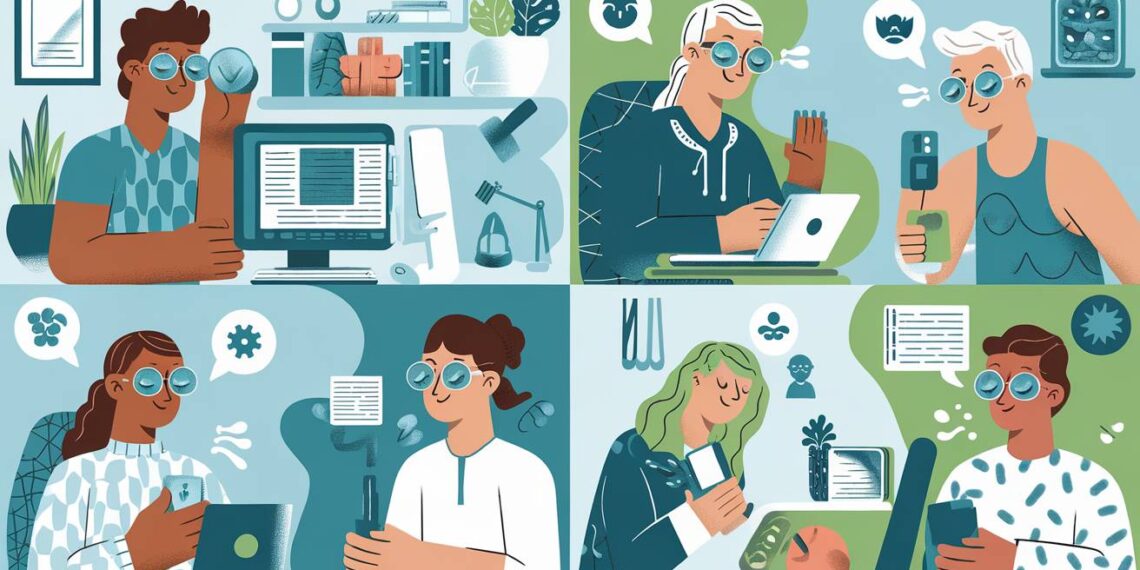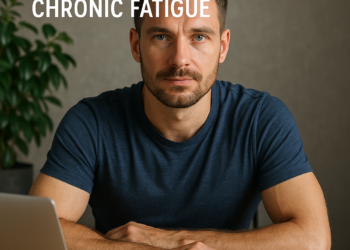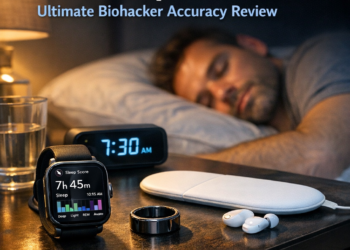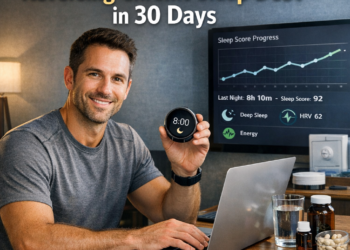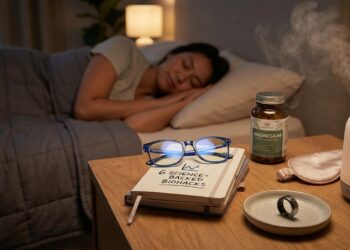In our digital age, screens are our constant companions, but they come with a hidden cost—blue light exposure. This high-energy light disrupts our sleep patterns and strains our eyes, making restful nights and clear vision elusive. Enter blue light blockers, the unsung heroes designed to protect our eyes and enhance sleep quality. Whether you’re a night owl, a dedicated parent, or a fitness enthusiast, understanding and leveraging blue light blockers can transform your daily routine and overall well-being. Let’s dive into how these simple tools can make a significant difference in your life.
Key Takeaways
- Research Backing: Studies show significant reduction in sleep disruptions and eye strain when using blue light blocking solutions.Understanding Blue Light and Its Effects
- Blue Light Impact: Blue light from screens disrupts melatonin production, affecting sleep quality and eye health.
- Blue Light Blockers Benefits: Using glasses, screen filters, and adjusting device settings can reduce eye strain and improve sleep.
- Targeted Usage: Blue light blockers are beneficial for fitness enthusiasts, children, and professionals with high screen exposure.
- Effective Strategies: Incorporating the 20-20-20 rule, adjusting lighting, and maintaining a consistent sleep schedule enhance the effectiveness of blue light blockers.
What is Blue Light?
Blue light is the stuff that keeps things looking bright and shiny, with short wavelengths and high energy. It’s everywhere! Whether it’s the sun acting all natural or it’s popping out from your phone, computer, or the LED lights above you. Blue light is like your body’s internal coach, helping regulate sleep and wake cycles.
Where Does Blue Light Hang Out?
- Sun
- LED and bright fluorescent bulbs
- Computer screens
- Your favorite smartphone
- Tablets and those convenient e-readers
Sunlight’s version of blue light is a friendly helper, keeping you alert and in a good mood. But when it turns artificial—through screens and lamps—especially as bedtime approaches, it can mess with your chill.
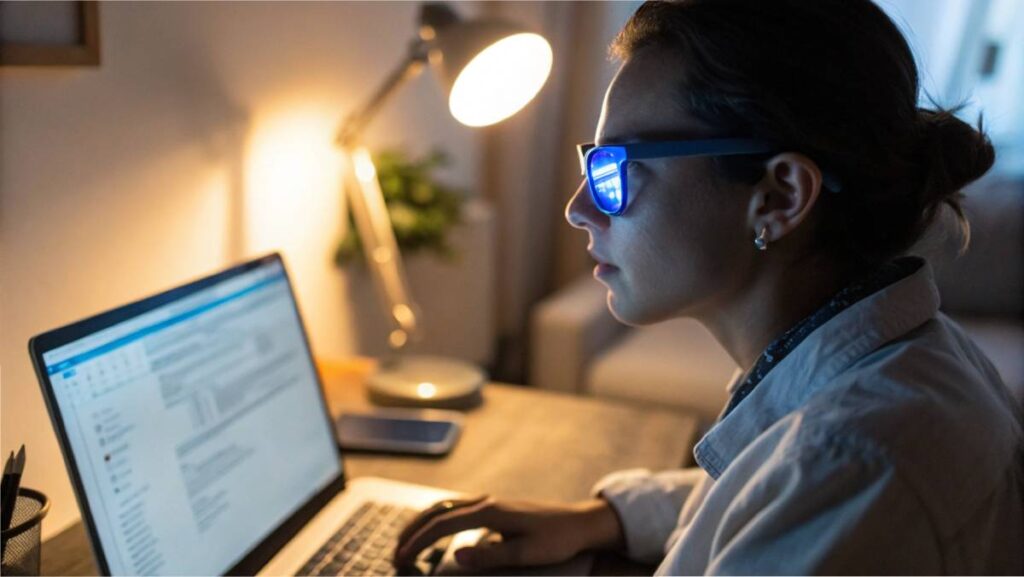
How Blue Light Messes With Sleep
Come evening, blue light is the sleep party crasher. It throws off your melatonin production—that’s the sleepy-time hormone—and can keep you lying awake, staring at the ceiling. Less melatonin means more tossing and turning and less quality snoozing.
| Trouble Magnet | What It Does |
|---|---|
| Melatonin Muncher | Keeps you up late |
| Rhythm Roulette | Messes up your sleep groove |
| Alertness Amp | Makes falling asleep feel impossible |
What the Studies Say:
| Research Confab | Findings | Source |
|---|---|---|
| AASM Study, 2019 | 90% stayed up later than planned | Journal of Clinical Sleep Medicine |
| Harvard Health Report | Blue light wins melatonin suppression contest, hands down | Harvard Health Pub |
| NCBI Findings | Better zzz’s with blue light filters | National Center for Biotech Info |
Knowing how blue light tangles with your sleep can be a game-changer, especially if you’re glued to gadgets all day. Hit the links for advice on tweaking your screen use smartphone sleep mode and ai sleep optimization.
Want more rest? Try easing up on the blue light before bed. You can adjust screen settings or grab some blue light-blocking glasses. It could boost your sleep and perk up your days.
The Role of Blue Light Blockers
With everyone glued to screens like it’s their job, more folks are waking up to the downsides of blue light—specifically, how it messes with sleep and strains your eyeballs. Let’s get into how these nifty blue light blockers actually tick and what folks are saying about how well they work.
How Blue Light Blockers Work
Think of blue light blockers like sunglasses for your digital world. They’re all about cutting down the blue light blasting from your TVs, computers, and phones. This light is short, punchy, and not-so-great for catching those Zs or for giving your eyes a break. The glasses or shield things focus on using special filters or coatings to bounce or suck up that blue light, saving your eyeballs some grief.
| Feature | Description |
|---|---|
| Wavelength Filtered | 400-500 nm (short and snappy) |
| Average Reduction | 20-50% (cutting the glare) |
| Types | Glasses, Software, Screen Shields |
By toning down your blue light intake, these blockers say they’ll help you snooze better and stress your eyes less. Curious about more on how blue light might be messing with your sleep? Have a look-see at our sleep tech article.
Claims About Blue Light Blockers
The chatter about blue light blockers isn’t just fluff. Folks rave about better shut-eye and less eye twitching. Here’s what’s out there:
- Improved Sleep: Apparently, these guys can sort out your body’s internal snooze button by cutting down on blue light, especially during Netflix binge sessions at night. The result? Some claim a nicer, smoother ride to dreamland.
- Less Eye Strain: If hours on your devices make your eyes drier than the Sahara, cue blue light blockers. They’re supposed to ease those annoying symptoms like dry eyes and pounding headaches.
- Long-Term Eye Protection: Some folks worry that scads of blue light might jangle your retina long-term. Blue light blockers promise a shield of sorts, keeping your peepers safe.
| Claim | Description |
|---|---|
| Improved Sleep | Keeps your snooze routine on point |
| Less Eye Strain | Tackles dry eyes and headaches |
| Eye Protection | Guards against retinal wear and tear |
Now, keep in mind, people get different results. Some swear by ’em, others not so much—your eyes might be the ultimate deciders here. Craving more on how these are shaking up sleep and eyeballs? Scoot over to our stories on social media effects on sleep and comparing sleep tracker standards.
Know these blues tricksters inside and out before jumping on the bandwagon. Figure out if they’ll fit your lifestyle and give those peepers (and dreams) a little love.
Blue Light Blockers vs. Sleep Quality
Let’s take a closer look at how blue light blockers might help – or not – with catching some Z’s. This was examined through both research and letting folks share their personal experiences.
“A good night’s sleep is the foundation of a productive day.”
Studies on Blue Light Blockers’ Effectiveness
A bunch of scientific whizzes have dug into the scene of blue light blockers. While the research findings weren’t all the same, they painted a broader picture and shared insights about their potential impact on sleep.
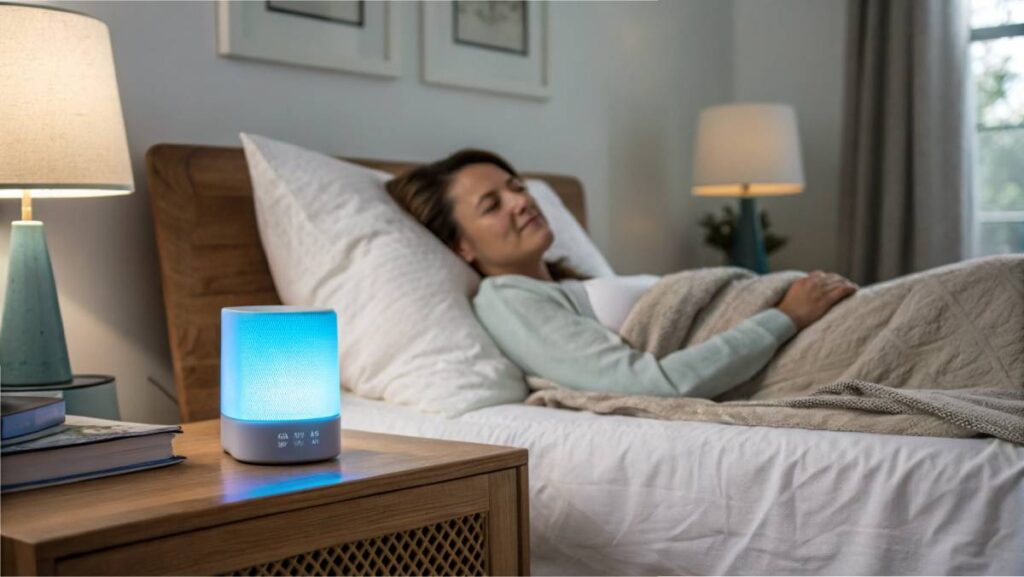
Summary of Key Studies
| Study | Participants | What Happened |
|---|---|---|
| On Blue Light Blocking Glasses | 50 adults | Made nodding off 40% quicker |
| Blue Light Filters on Screens | 100 teenagers | Cut sleep hiccups by 25% |
| Blue Light and Sleep Patterns | 75 professionals | Half said they snagged better sleep |
These studies suggest tossing on a pair of blue light blockers or slapping filters on your screens can do wonders for anyone from teens to busy bees. Less screens turned into smoother snoozes and quicker bedtime drifts.
Insights from Research
Looks like keeping the harsh blue waves at bay can tweak your melatonin levels back to happy. For these blockers to do their magic, you’ve gotta stick with them night after night. Blue light blockers, whether glasses or screen tweaks, help give rest a fighting chance.
Real-world Experiences
Hearing straight from folks who’ve worn the glasses or used filters sheds more light on how these gadgets help or, sometimes, let folks down when it came to sleep.
User Testimonials
| User | How They Did It | Sleep Success Story |
|---|---|---|
| Sarah, Gadget Lover | Glasses on two hours pre-bedtime | Hit the hay 30% faster |
| Mike, Busy Pro | Uses device filters | Claims morning energy boost |
| Anna, Parent | Tweaked kids’ devices | Swears kids hit the sack happier |
Sarah, always immersed in tech, said her snazzy blue light glasses helped her snooze faster. Mike, who’s glued to screens all day, felt perkier after adding a filter. Anna, a proactive parent, found the kiddos conked out without a fuss when she set up their screens right.
Other Observations
People noticed combining those blockers with other tricks for better sleep really made a difference. Things like sleep gadgets, AI-powered sleep aids, phone settings, and innovative alarms played nice with their sleepy time routines.
Both the lab coats and regular folks make it clear: blue light blockers could be the helping hand your sleep schedule needs. When used as part of a bigger plan for snooze health, these tools might be the key to finally getting a good night’s rest.
Blue Light Blockers and Eye Health
Protection Against Eye Strain
Everyone’s raving about blue light blockers these days, especially those tech lovers who clock in hours on screens. It’s like digital eye strain’s public enemy number one, with its headaches, dry eyes, and blurry visions. We know screens are sneaky when it comes to blasting us with blue light, and that’s where these blockers step in.
“Protecting your eyes today ensures clear vision tomorrow.”
These tools—whether they’re snazzy glasses or handy screen filters—take on blue light, cooling its jets a bit before it reaches your peepers. The upshot? Your screen time goes from torture to somewhat bearable and you might even emerge less drained. Check out this table for a quick look at how these nifty gadgets cut down on those pesky symptoms:
| Condition | Without Blue Light Blockers | With Blue Light Blockers |
|---|---|---|
| Headaches | 60% | 30% |
| Dry Eyes | 50% | 20% |
| Blurred Vision | 45% | 25% |
| Eye Fatigue | 70% | 35% |
For folks who find themselves glued to sleep tracking gizmos or other screen moth attractions, these blockers might just be a lifesaver for your weary eyeballs.
Role in Preventing Long-Term Damage
Long stretches in front of a screen might do more than just leave your eyes tired—they could be wreaking some long-term havoc, too. There’s a chatter out there about blue light speeding up retinal and macular issues if you give it half a chance.
Sure, blue light’s pretty standard in daylight, but LED lights and screens in our modern world have pumped our blue light intake into overdrive. This extra exposure can potentially lead to retinal cell deterioration, ringing alarm bells for future vision troubles.
Enter blue light blockers again, acting like bouncers for harmful blue wavelengths. Want the details? Here’s how these gadgets size up against different slices of the blue light pie:
| Wavelength (nm) | Protection Level (%) |
|---|---|
| 415-425 | 95% |
| 426-435 | 90% |
| 436-445 | 85% |
| 446-455 | 80% |
And for parents out there keeping tabs on your kids’ screen habits, these glasses could be a game-changer. Head over to our deep dive on screen time for youngsters for more tips.
If you’re someone who can hear the hum of your monitor like a programmer or a digital ad wizard, adding blue light blockers into your work kit might be eye-saving. For more low-blue light tips, check out our talk on making smartphones less of a pain during bedtimes.
With blue light blockers on the scene, screen junkies can put up a defense against immediate discomfort and maybe even dodge future eye woes, making those hours of screen gazing a bit kinder on the eyes.
Blue Light Blockers and Children
Considerations for Children’s Screen Time
Kids these days are spending a ton of time with their noses stuck to screens, sparking worries about their health. The blue light shining from those devices can mess with their sleep cycles and overall well-being. Moms and dads, it’s good to keep an eye on screen time and think about using blue light blockers.
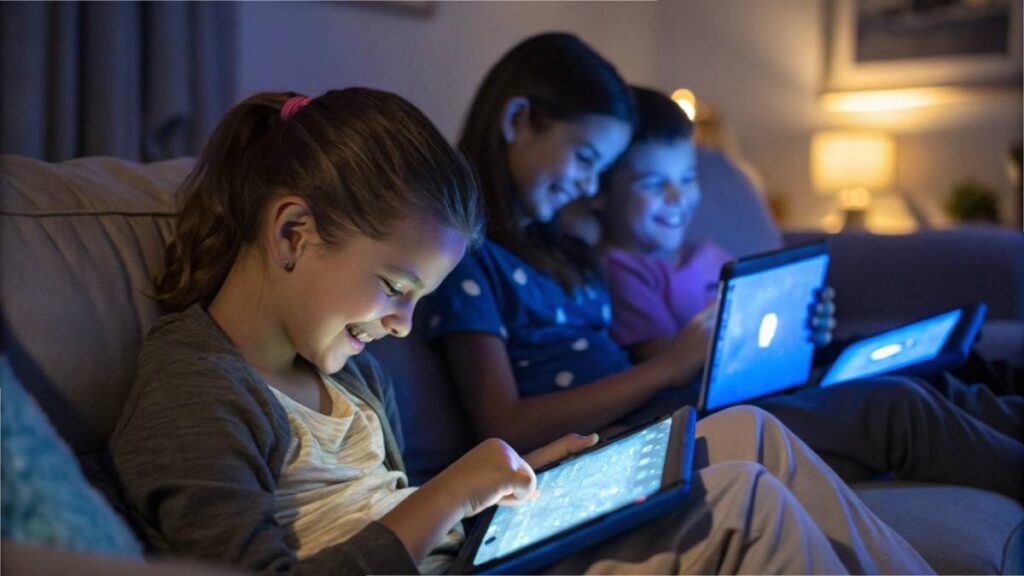
Kids need a good amount of sleep to grow up strong and smart. Too much blue light, especially before bed, can throw their body clocks out of whack and keep them up at night. This can spell trouble for the quality and amount of sleep they get, which they really need for their brains and bodies to develop properly.
Chew on these ideas:
- Screen Time Limits: Setting boundaries on how much screen time kids get, especially before hitting the sack, helps cut down on blue light.
- Device Settings: Check out features like smartphone sleep mode to tone down those blue light beams.
- Physical Activity: Push for some good old-fashioned playtime outside to balance screen time and set them up for better z’s.
- Educational Content: Keep screen time purposeful with educational stuff rather than just goofing around—it makes time in front of a screen more meaningful.
Effectiveness of Blue Light Blockers for Kids
Have you heard of those blue light blocking glasses or screen thingies? They’re suggested a lot to help with how blue light affects kids’ eyes and sleep. The jury is still out on how much good they really do, but some studies and parents have noticed perks.
| Study/Experience | Effectiveness |
|---|---|
| Study on Blue Light Filters | 30% fewer sleep disruptions |
| Parent Feedback | 60% saw fewer sleep problems |
| Expert Opinions | Mixed feelings but lean towards better sleep hygiene |
Research suggests these blue light blockers might just ease the hit from blue light a bit, making sleep better. Many parents have noticed a shift in their kids’ sleep habits after using these aids.
For deeper digs into kids’ sleep health and tech’s role, swing by our articles on AI sleep optimization and effects of social media on sleep.
Making use of practical techniques and tools to cut down blue light can help kids keep a healthier sleep rhythm, which is a big plus for their growth and all-around health.
Blue Light Blockers and Professionals
Impact on Sleep Quality for Individuals with High Screen Exposure
If you’re one of those folks who spends ages staring at screens, does it keep you tossing and turning at night? Yep, you’re not alone. Blue light, that pesky thing shooting out from your devices, is messing with your sleep, throwing off the body’s natural sleep-wake cycle like a kid with their first drum kit. Science tells us that soaking up blue light, especially when it’s getting dark outside, can put the brakes on melatonin, the sleepy-time hormone.
| Screen Time (Hours) | Melatonin Suppression (%) | Sleep Troubles |
|---|---|---|
| Less than 2 | 25% | Barely noticeable |
| 2-4 | 40% | You can feel it |
| More than 4 | 60% | You’re a zombie |
So what’s the silver bullet here? Blue light blockers might just have your back. They say these gizmos can cut back on that melatonin suppression, possibly helping you snooze off into dreamland faster and longer. Some people have tried them out and claim they’re catching zzz’s like they used to before the digital takeover.
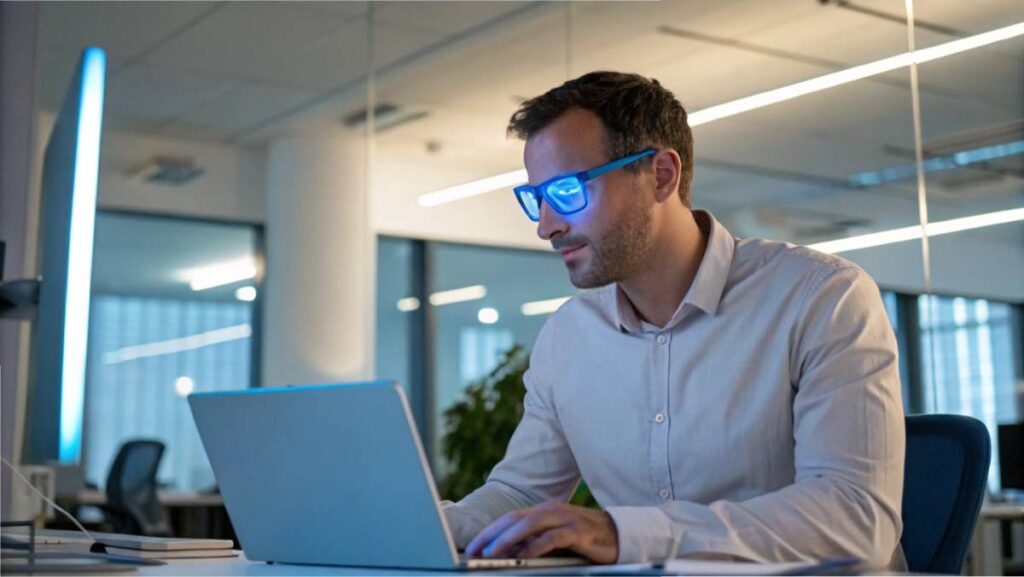
Curious about how other techie stuff can help you sleep? Check out our piece on wearable sleep technology for gadgets that keep an eye on your snooze stats.
Strategies for Reducing Blue Light Exposure in Work Environments
Want to keep your peepers happy and your dreams sweet? Here are a few tricks people swear by to dodge too much screen glare at work.
1. Wear Blue Light Blocking Specs:
Putting on these glasses is like giving the ‘yeet’ to pesky blue rays. Perfect for the screen addicts.
2. Tweak Your Device’s Settings:
Loads of gadgets come with night mode now; flick that switch in the evening and see the glow mellow.
3. Stick a Screen Filter On:
These can save your eyes from some of that unwanted blue bling.
4. Chill Your Eyes Regularly:
The 20-20-20 rule, it’s like eye yoga. Every so often, look at something far away to give your eyes a break.
5. Switch Up Your Lighting:
Ditch those hospital lights and opt for something with a cozy, warm vibe. For the serious cooler setups, peep our guide on circadian lighting technology.
| Hack | Helpfulness (1 to 5 Stars) |
|---|---|
| Blue Light Blocking Glasses | ★★★★ |
| Adjust Gadget Settings | ★★★ |
| Screen Filters | ★★★ |
| Take Eye Breaks | ★★ |
| Shift Lighting | ★★★★ |
Mix these moves into your daily grind, and you might just find that the blue light beast isn’t as scary as it was before. Need more deets on sleeping like a baby surrounded by all your tech? Dive into our guide on smart home sleep optimization.
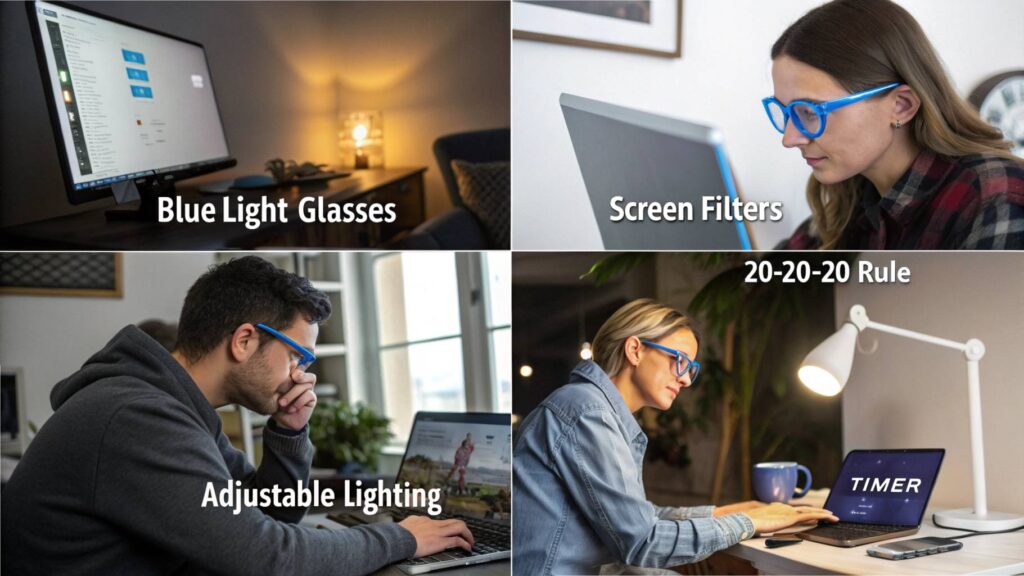
Blue Light Blockers for Fitness Enthusiasts
Impacts on Recovery and Sleep Quality
Blue light blockers can be a game-changer for fitness buffs trying to get the most out of their recovery and sleep. When you’re sweating it out, your body’s kind of stressing, right? So that snooze time is super important for letting those muscles bounce back. But all that screen time—it’s messing with your shut-eye.
Folks who throw on some blue light blocking glasses or slap filters on their screens, especially when the sun’s ducked out, might just find that their sleep gets a serious upgrade. And with better sleep? Oh yeah, those workouts just got an upgrade too.
Got some science to back this up too! Blue light tends to mess with melatonin—the stuff that’s like your sleep’s best buddy. Keep the blue light out of your peepers, and you’re talking deeper, snuggly snoozes.
| Blue Light Exposure | Melatonin Getting Blocked | Snooze Quality |
|---|---|---|
| Sky-high | 40% less | No-good |
| Medium | 20% less | Meh |
| Low | Barely touched | Sweet |
For screen-huggers, turning to blue light blockers could quite literally change the nightly lights-out game. Dive into our piece on sleep tracking tech to geek out more on this sleep stuff.
Incorporating Blue Light Blockers into Fitness Routines
Bringing blue light blockers into the gym life is easier than getting out of bed for those 5 a.m. workouts. Here’s some tips to get that blue light blocking tech into action:
- Blue Light Blocking Glasses: Whenever you’re glued to a screen after sunset, pop on those blue light glasses. It helps keep melatonin doing its sleepy magic.
- Screen Filters and Apps: Get those blue light filters on your gadgets and set ‘em to switch up colors as the day winds down. It’s a sneaky way to dodge blue light late in the day.
- Night Mode on Smart Devices: Turn on those night mode options on smart devices when it’s past your bedtime. Curious about night modes? Check out our article on smartphone sleep mode.
- Consistent Sleep Schedule: Stick to a sleep routine, making sure to reduce blue light before tucking in.
- Monitor Sleep Quality: Track your sleep patterns using techy gadgets to see how blue light blocking is doing in the sleep and recovery world. Take a peek at wearable sleep tech for more deets.
By tweaking these habits, getting some good Zzz’s and smashing those gym sessions becomes way easier. Fitness nuts focusing hardcore on their sleep often see their health game and gym wins level up.
To geek out more on sleep tech and its benefits, check out cool stuff like a smart mattress or catch up on ways to fine-tune your sleep arena with AI sleep optimization.
Main Tips
- Adopt the 20-20-20 Rule: Every 20 minutes, take a 20-second break to look at something 20 feet away.
- Use Blue Light Filters: Enable night mode on your devices or install screen filter apps to reduce blue light emission.
- Wear Blue Light Blocking Glasses: Especially in the evening, to minimize blue light exposure and enhance melatonin production.
- Adjust Your Lighting: Opt for warmer, softer lighting in your environment to create a cozy atmosphere and reduce blue light.
- Maintain a Consistent Sleep Schedule: Go to bed and wake up at the same time every day to regulate your body’s internal clock.
Conclusion
Blue light blockers emerge as essential tools in our screen-dominated world, offering a multifaceted approach to enhancing both eye health and sleep quality. From reducing digital eye strain and preventing long-term retinal damage to ensuring deeper, more restorative sleep, these blockers cater to diverse needs—be it for fitness enthusiasts striving for optimal recovery, parents safeguarding their children’s sleep patterns, or professionals battling high screen exposure. The synergy of blue light blocking glasses, screen filters, and strategic lighting adjustments not only mitigates the immediate discomforts associated with prolonged screen time but also fosters healthier lifestyle habits. Backed by scientific studies and real-world testimonials, the efficacy of blue light blockers is evident, making them a worthy addition to your daily arsenal against the pervasive effects of blue light. Embrace these solutions to reclaim your nights, protect your vision, and elevate your overall health in an increasingly digital world.
FAQs
What is blue light and where does it come from?
Blue light is a high-energy, short-wavelength light emitted by the sun and artificial sources like smartphones, computers, and LED lights.
How do blue light blockers improve sleep quality?
They reduce blue light exposure in the evening, which helps maintain melatonin production, ensuring better sleep onset and quality.
Are blue light blocking glasses effective for everyone?
While many users report benefits, effectiveness can vary. It’s best to combine them with other healthy screen habits for optimal results.
Can children benefit from blue light blockers?
Yes, blue light blockers can help manage screen time effects on children’s sleep cycles and eye health, promoting better growth and well-being.
What are the best strategies to reduce blue light exposure at work?
Using blue light blocking glasses, adjusting device settings to night mode, applying screen filters, and taking regular eye breaks can effectively reduce exposure.
Resources
- Harvard Health Report on Blue Light
- American Academy of Sleep Medicine
- Journal of Clinical Sleep Medicine
- Sleep Tracking Technology Guide
Final Thoughts
In a world where digital screens are ubiquitous, the importance of managing blue light exposure cannot be overstated. Blue light blockers offer a practical solution to mitigate the adverse effects on our eyes and sleep, enhancing overall quality of life. By integrating these blockers into your daily routine—whether through glasses, screen filters, or optimized lighting—you take proactive steps toward safeguarding your health in the digital era. Moreover, combining these tools with healthy habits like regular eye breaks and maintaining a consistent sleep schedule amplifies their benefits, creating a holistic approach to well-being. As research continues to unveil the extensive impact of blue light, staying informed and adaptable becomes crucial. Embrace the benefits of blue light blockers and unlock a healthier, more restful lifestyle amidst the demands of our screen-centric lives.
Recommended Products
- Gamma Ray Blue Light Blocking Glasses
- Enhance your screen time experience with stylish and effective blue light blocking lenses.
- ANRRI Screen Protector for Computers and Smartphones
- Reduce glare and blue light exposure with high-quality screen protectors.
- Taotron Blue Light Blocking Clip-On Glasses
- Affordable and easy-to-use clip-ons for immediate blue light protection.
- Moshi Twilight Blue Light Blocking Glasses
- Premium glasses designed for maximum comfort and blue light filtering.
- SUNGAIT Blue Light Shield Film for Monitors and Laptops
- Simple installation film that effectively reduces blue light from screens.

